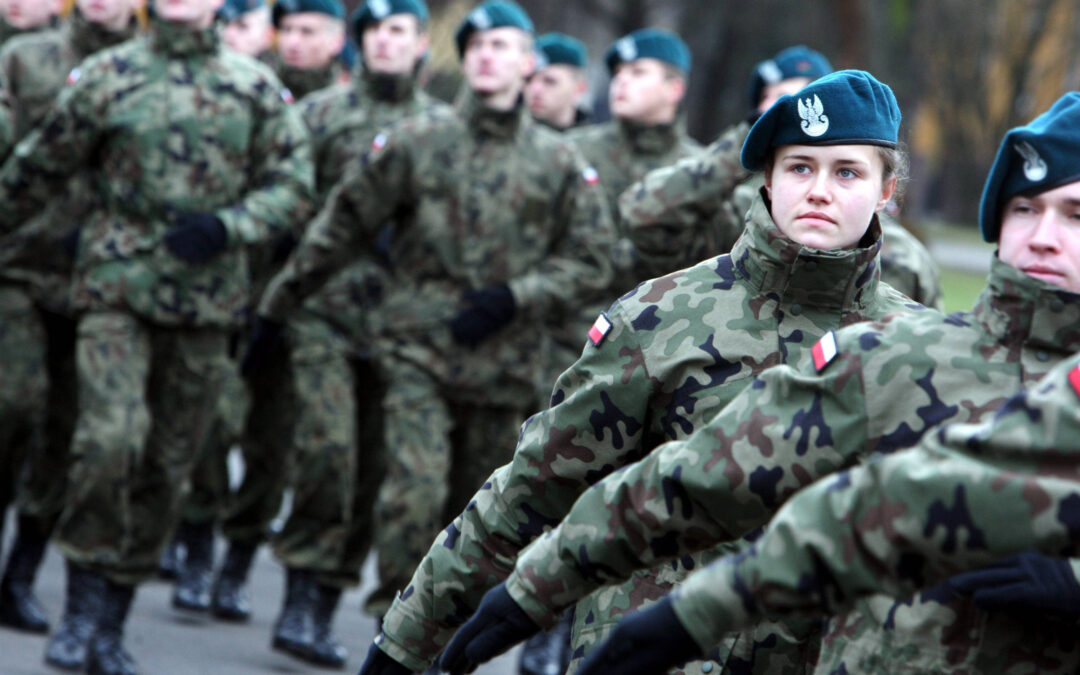Poland’s first ever organisation supporting women serving in the armed forces has been set up by two former officers. The foundation’s main aims are tackling sexual harassment and discrimination, issues that they say the authorities currently do little to prevent, investigate or even document.
“Sexual harassment, bullying and unequal treatment are an everyday occurrence for women in the uniformed services,” say the women behind the SayStop Foundation – Corporal Katarzyna Kozłowska, a former operator in Poland’s GROM special forces unit, and Second Lieutenant Joanna Jałocha, who served in the Military Gendarmerie.
Recent years have seen a number of reports of harassment of women in the armed services, as well as claims that they were not dealt with seriously by the military hierarchy. Jałocha is herself among those who have filed allegations of abuse.
She and Kozłowska note, however, that the true extent of the problem is impossible to gauge because the military authorities have not put any system in place for independent investigation or even keeping records of complaints.
When Onet recently asked the defence ministry how many allegations of bullying or harassment it has received and how many investigations have been completed, it said that no such statistics are kept. “The military assumes that if there are no statistics, there is no problem,” said Jałocha.
Data cited by the Forsal news website in 2016 indicated that, from 2010 to 2016, the defence ministry conducted only 16 preparatory proceedings in connection with allegations of sexual harassment. By contrast, in the US Army, around 1,100 such proceedings are initiated every year, according to NPR.
Moreover, in Poland such allegations are investigated internally, with proceedings and outcomes often ending up classified, preventing the accuser from accessing information about how the case was conducted. This allows each branch of the armed services to effectively act as its own judge, said Jałocha.
“When I filed a complaint to the Military Gendarmerie headquarters, internal proceedings were initiated, which were conducted by the commandant’s subordinates and immediately classified,” she told Onet. “To this day I do not know how they were conducted, on the basis of what regulations, or what materials were gathered.”
In a high-profile case from 2017, former Military Gendarmerie officer Karolina Marchlewska accused a fellow soldier of sending her obscene text messages and a senior officer of groping her. When Marchlewska told a superior, he responded by asking her questions about her private life.
The internal investigation into these allegations was later discontinued, and Marchlewska herself lost her job. “I am being made guilty, a perpetrator,” Marchlewska told TOK FM. “There was no help, either from the defence ministry, or from the command of the Military Gendarmerie.”
Pierwszy zarzut w sprawie molestowania żołnierki w Żandarmerii Wojskowej – Wiadomości https://t.co/7gvsfETuI4
— Anetta Araj (@AnettaAraj) October 8, 2019
Captain Bożena Szubińska, a former defence ministry representative for women in the military service, told Onet last year that “the military is unable to cope with violence against women”.
“Women do not report [cases] to military law enforcement agencies [because] they are afraid of repercussions, stigmatisation and harassment,” she said. Even when they do make reports, “they often, under pressure, withdraw cases at the prosecution stage”.
“Worse still,” Szubińska added, the method of “solving the problem” is simply to “remove the women who report harassment from the ranks of the military”.
“They leave, they become civilians, and everyone is satisfied; they believe that this is [then] no longer a military problem,” said Szubińska. “Nothing could be further from the truth. The crime took place in the military and the military should feel responsible.”
Szubińska has called for cases to be dealt with by the public justice system, rather than in military courts. The SayStop Foundation is aiming to create an independent body to oversee cases of abuses against women in the military and other services.
“The services still do not have standardised anti-discrimination and anti-bullying procedures, and there is not even any standardised terminology in this area,” Kozłowska told Onet.
The defence ministry, however, says that “every soldier, regardless of gender, age, race, religion, sexual orientation or rank, is protected by the provisions of the General Regulations of the Polish Armed Forces, which prohibit bullying and harassment”.
The ministry also claims that it holds workshops and training regarding this issue. Kozłowska, however, says that she does not remember any such education taking place.
The SayStop Foundation plans to address these issues by creating internal and legislative solutions modelled on procedures introduced by the US military. They are seeking to cooperate with Protect Our Defenders, an NGO that was the first organisation in the United States dedicated to victims of sexual crimes in the army.
SayStop is also working with Blue Line, a Polish telephone helpline for victims of domestic violence, and other NGOs which will provide legal and financial support to those pursuing cases.
Main image credit: Paweł Kozioł / Agencja Gazeta

Juliette Bretan is a freelance journalist covering Polish and Eastern European current affairs and culture. Her work has featured on the BBC World Service, and in CityMetric, The Independent, Ozy, New Eastern Europe and Culture.pl.




















